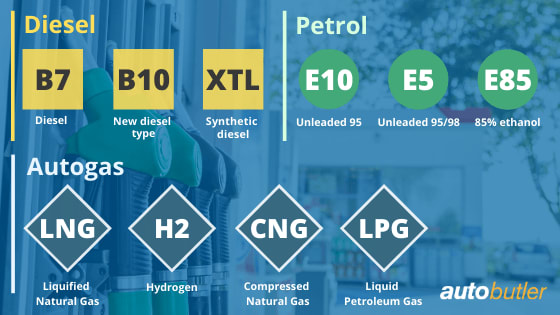
Gasoline, diesel, biofuel, autogas. Here's an overview of the different types of fuel!
Content
Fuel is needed to keep the car running. However, the type of fuel your car needs depends on its engine. Diesel, hydrogen, bioethanol… It can sometimes be difficult to understand the many types of fuel, especially their differences and uses.
How do you know which fuel is best for your vehicle?
First of all, it is important to know what type of fuel to choose at gas stations. Failure to do so may result in severe damage to your vehicle's engine. That's why we've put together an overview below where you can find information on the many fuels available in the UK. If you do not know what type of fuel your vehicle needs, refer to the vehicle manual, i.e. the vehicle owner's manual.
What are the types of fuel?
Following the introduction of a harmonized set of fuel labels in the EU in October 2018, some labels and names may confuse you. Look below.

Diesel
Diesel has long been the fuel of choice because it is cheaper than gasoline in the long run. Diesel fuel is of three types.
- B7 is the most widely used standard diesel engine. It contains 7% of a biocomponent called fatty acid methyl ester (FAME).
- B10 ii is a new type of diesel fuel that contains higher levels of biofuel up to a maximum of 10%. It has not yet been introduced in the UK, but has already launched in France.
- XTL is a synthetic diesel fuel and is not made from petroleum. Part of it comes from paraffinic oil and gas.
Petrol
Like diesel, there are 3 main types of gasoline. This type of fuel will always be identified by a circled E (E for ethanol).
- E5 matches both SP95 and SP98 labels. It contains up to 5% bioethanol, a fuel made from agricultural raw materials such as corn or other crops.
- E10 it is a gasoline type containing 10% bioethanol. It hasn't been introduced in the UK yet, but it probably will will be launched in 2021.
- E85 contains 85% bioethanol. It is not commercially available in the UK, but can be found throughout Europe, especially in France, where it is called superethanol.
Autogas
- LNG stands for Liquefied Natural Gas and is especially common for heavy vehicles.
- H2 means hydrogen. The advantage of this fuel is that it does not produce CO2. However, it takes a lot of energy to produce it.
- CNG, or compressed natural gas, is the same gas used to heat homes. It consists of methane stored under high pressure.
- FUEL means liquefied petroleum gas. This fuel is a mixture of butane and propane.
What is the future of automotive fuel in the UK?
Before buying a car, it is important to learn more about the different types of fuel available and which one is compatible with the car. And in the future, the landscape of fuel types may change as new bioethanol blends take over the market and we move towards a greener future.
As more and more vehicles in Europe become green fuel compatible, petrol in the UK could contain even more biofuels, working as a temporary solution before we move to a purely electric car fleet. How the government decided to ban the sale of all petrol and diesel cars by 2040, it will be necessary to present initiatives to facilitate this transition.

